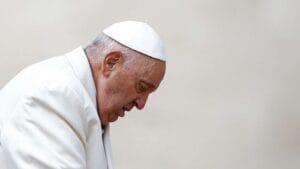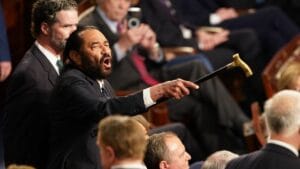The courtroom was tense as Nnamdi Kanu’s case resumed before Justice James Omotosho at the Federal High Court in Abuja. The spotlight was on the Department of State Services (DSS) operative, as the DSS witness tells court that no weapon or item related to terrorism was found on Kanu. This testimony added another layer of complexity to a case that has spanned nearly a decade.
It was a day filled with revelations, and perhaps more questions than answers. What really happened during the arrest? Were there items that could link Kanu to violence? Or was this just another chapter in a long, troubled political battle?
The Man Behind the Testimony: DSS Witness Takes the Stand
The DSS operative, who had a direct role in Kanu’s arrest, gave detailed responses under cross-examination. When asked about the video recording shown in court, he explained that five officers were present in the room and that he was one of them.
He stated clearly that his responsibility ended at arresting Kanu, obtaining his statement, and transporting him to Abuja. He was not part of the broader investigation team.
The defence asked several questions about the items taken from Kanu during his arrest. When questioned if any of the items looked dangerous or linked to terrorism, the DSS witness tells court that nothing offensive or violent was found.
DSS Witness Tells Court: No Dangerous Items Found on Kanu or Female Companion
The defence counsel, Kanu Agabi, asked about a woman who was with Kanu at the time of arrest. Was she aiding terrorism? The DSS witness replied that no, nothing violent or threatening was found on her either, and her presence was not seen as a security threat.
This line of questioning was crucial. It painted a picture of an arrest that lacked concrete evidence of violent activities or support systems. The defence emphasized that in all the years since the arrest, no solid proof of terrorism had surfaced.
“Did You Analyse the Recovered Items?” – Defence Pushes Further
The DSS operative admitted that out of all the confiscated items, only Kanu’s phone was analyzed. Interestingly, he mentioned that even that analysis was not presented in court because it was considered unimportant to the case.
The defence jumped on this. “If the phone was analyzed, and yet the result wasn’t added as evidence, what does that say?” Kanu’s legal team appeared to suggest that the lack of relevant content undermines the prosecution’s case.
The DSS operative agreed that many of the confiscated items were now outdated and possibly unusable due to the long delay—over ten years—since the initial arrest.
Was Anything Returned to Kanu?
Another major question was whether the DSS had returned any of the seized items. The DSS witness tells court that there was a record of returned items, though he personally did not keep those records.
This left room for doubt. Without direct accountability or documentation in court, the defence implied that vital evidence could have been tampered with or lost over time.
DSS Witness Tells Court: “Kanu’s Supporters Are Known, But He Didn’t Name Them”
The defence asked if the DSS had investigated people Kanu may have worked with. The DSS witness replied that Kanu did not mention anyone by name during questioning.
However, he acknowledged hearing about supporters like Simon Ekpa on social media and in newspapers. He even mentioned that the Nigerian government was working on bringing Simon Ekpa back from abroad to face charges.
Still, no official link had been drawn between these individuals and the specific crimes charged in court.
“No Act of Violence Traced to Kanu’s Words” – DSS Witness Admits
The DSS was also asked if Kanu was personally involved in any attacks or destruction. The operative said Kanu may not have physically committed any violent act. He also said he didn’t know of anyone who acted violently because of Kanu’s statements on social media.
This moment was critical. If the prosecution cannot prove that Kanu’s words led to any actual harm, then the case for incitement weakens.
DSS Witness Tells Court: “Kanu Called Nigeria A Zoo”
One of the more emotional points in the trial came when the DSS operative was asked what Kanu said about Nigeria. He couldn’t recall comments on corruption, unemployment, or poor development, but clearly remembered Kanu calling Nigeria a “zoo.”
To many in the courtroom, this language was offensive. But for the defence, it was proof that Kanu was voicing political opinions—not organizing armed rebellion.
The DSS witness also confirmed that Kanu once said that IPOB is not a militant group and does not provide weapons or training to its members.
“What About Other Killings in Nigeria?” – Defence Draws Comparisons
Kanu’s lawyer, Agabi, took a broader approach. He brought up tragic events across the country: killings in Kaduna, Zamfara, Benue, Plateau, and more. He asked whether those incidents were linked to any form of separatist agitation.
The DSS witness tells court that to his knowledge, those attacks were unrelated. This line of questioning was aimed at showing that Nigeria’s security issues go far beyond Kanu or IPOB.
He was also asked about attacks on farmers, churches, schools, and trains. Again, the DSS operative stated that these were not products of any agitation for separation.
This argument by the defence pushed the idea that blaming all forms of unrest on IPOB or its leader was inaccurate.
A Case Dragging for Nearly a Decade
Nnamdi Kanu’s legal battles are not new. His case started in 2015 after he was arrested in Lagos. The government charged him with terrorism and treasonable felony. However, the case faced multiple setbacks that delayed progress for years.
At the beginning, Kanu was not alone. Four others were charged along with him. But in 2018, the trial judge separated Kanu’s case from the others when he fled Nigeria. That allowed the government to continue prosecuting the remaining defendants.
After years of silence, the Nigerian government captured Kanu again in Kenya in June 2021 and brought him back. That was when the trial gained momentum again.
Are We Seeing a Political Trial in Disguise?
As the DSS witness tells court that no direct evidence of terrorism was found, the trial is now being seen by many as more political than legal. Was Kanu really a threat, or is he being punished for speaking up?
Many observers argue that if the charges are so serious, why has the prosecution failed to present strong, undeniable proof? Others say it’s about time Nigeria addressed political grievances with dialogue—not force.
Is the DSS Holding a Weak Case Together with Hearsay?
The DSS witness relied heavily on what he read online and in newspapers. He admitted he hadn’t personally investigated the people mentioned in the media. This weakens the weight of his testimony, the defence argued.
The lack of hard evidence, limited analysis of items, and reliance on second-hand information puts the prosecution under scrutiny. What remains unclear is whether stronger evidence will still be presented—or if this is all they have.
The Bigger Picture: Nigeria’s Security Problems Go Beyond IPOB
While IPOB has drawn global attention, Nigeria’s security challenges are widespread. From banditry to religious violence, to kidnappings, the roots of unrest run deep.
If Kanu is to be judged as a symbol of unrest, what about the many others causing harm? The DSS witness tells court that many violent acts were unrelated to IPOB or Biafra agitation. That admission could reshape how the public views this entire trial.
What Comes Next in the Trial?
Justice Omotosho continues to hear the case. It is still unclear when a verdict will be reached. However, the defence appears to be gaining ground by challenging the reliability of the DSS’s testimony.
So far, no weapon, document, or communication has been presented that directly connects Kanu to terrorism. That’s a significant point, especially considering the severity of the charges.
Is This Justice or Political Suppression?
With each testimony, the courtroom paints a more complex picture. The DSS witness tells court that Kanu had no instrument of terrorism, no violent companion, and did not directly incite violence. Is this enough to dismiss the charges?
For now, Nigerians watch and wait. The outcome of this trial may not only affect Kanu’s future but also shape how political dissent is handled in the country moving forward.
FAQs
Q1: What did the DSS witness say about Kanu’s items?
The DSS witness testified that none of the items found on Kanu were dangerous or linked to terrorism. He also mentioned only the phone was analyzed, and the result wasn’t presented as evidence.
Q2: Did Kanu admit to leading an armed group?
No. The DSS witness said Kanu stated that IPOB does not carry weapons or train its members for violence.
Q3: Was anyone else arrested with Kanu?
Yes, a woman was with Kanu at the time of arrest, but the DSS witness confirmed she wasn’t involved in any violent activity.
Q4: Why has the case taken so long?
Delays, changes in trial structure, and Kanu fleeing the country in 2018 contributed to the slow pace. He was re-arrested in 2021, restarting the process.
Q5: Is Simon Ekpa involved in the case?
The DSS witness mentioned Simon Ekpa as a known supporter of IPOB, but he is not directly involved in this trial at the moment. The government is reportedly working to extradite him.




